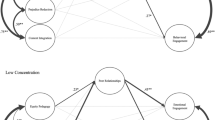Abstract
Background
Professionalism in the medical environment is a complex construct, dependent as much on the learner as on the context and climate. There are no data on how experiences of learners, related to professionalism, vary by learner ethnicity.
Purpose
Explore ethnic differences in medical student experiences of professionalism.
Methods
Quantitative and qualitative data from a survey of medical students exploring opinions and experiences related to professionalism were used. Two investigators categorized narratives into themes. Statistical analyses included Fisher’s exact and Wilcoxon tests.
Results
114 of 331 (34%) students (55% Caucasian) responded. Caucasians more frequently (73% versus 43%, p 0.002) found peer role models to be effective teachers of professionalism. Non-Caucasians more often reported unprofessional behaviors from faculty, staff or administration (55% versus 39%, p 0.03); these pertained more commonly to interpersonal interactions.
Conclusions
Compared to other ethnicities, Caucasian students identify peer role models more frequently as teachers of professionalism. Non-Caucasian students more often report unprofessional behaviors from faculty, staff, or administration. This may arise from differences in perception, true bias or both.
Similar content being viewed by others
References
Hafferty F. W. Beyond curriculum reform: confronting medicine’s hidden curriculum. Acad Med. 1998;73:403–7.
Park J., Woodrow S. I., Reznick R. K., Beales J., MacRae H. M. Observation, reflection, and reinforcement: surgery faculty members’ and residents’ perceptions of how they learned professionalism. Acad Med. 2010;85:134–9.
Al-Eraky M. M., Chandratilake M. How medical professionalism is conceptualised in Arabian context: a validation study. Med Teach. 2012;34 Suppl 1:S90–5.
Richardson D. A., Becker M., Frank R. R., Sokol R. J. Assessing medical students’ perceptions of mistreatment in their second and third years. Acad Med. 1997;72:728–30.
Woolley D. C., Paolo A. M., Bonaminio G. A., Moser S. E. Student treatment on clerkships based on their specialty interests. Teach Learn Med. 2006;18:237–43.
Wilkinson T. J., Wade W. B., Knock L. D. A blueprint to assess professionalism: results of a systematic review. Acad Med. 2009;84:551–8.
Richeson J. A., Ambady N. Effects of situational power on automatic racial prejudice. J Exp Soc Psychol. 2003;39:177–83.
Dyrbye L. N., Thomas M. R., Eacker A., Harper W., Massie F. S., Jr., Power D. V., Huschka M., Novotny P. J., Sloan J. A., Shanafelt T. D. Race, ethnicity, and medical student well-being in the United States. Arch Intern Med. 2007;167:2103–9.
Strayhorn G., Frierson H. Assessing correlations between black and white students’ perceptions of the medical school learning environment, their academic performances, and their well-being. Acad Med. 1989;64:468–73.
Ambady N., Gray H. M. On being sad and mistaken: mood effects on the accuracy of thin-slice judgments. J Pers Soc Psychol. 2002;83:947–61.
Kenny D. A. PERSON: a general model of interpersonal perception. Pers Soc Psychol Rev. 2004;8:265–80.
Mohr C., Kenny D. The how and why of disagreement among perceivers: An exploration of person models. J Exp Soc Psychol. 2006;42:337–49.
Pichon S., Rieger S. W., Vuilleumier P. Persistent affective biases in human amygdala response following implicit priming with negative emotion concepts. Neuroimage. 2012;62:1610–21.
Barak M. E. M., Cherin D. A., Berkman S. Organizational and personal dimensions in diversity climate. J Appl Behav Sci. 1998;34:82–104.
Barak M. E. M., Levin A. Outside of the corporate mainstream and excluded from the work community: a study of diversity, job satisfaction and well-being. Community Work & Family. 2002;5:133–57.
Phelps R. E., Taylor J. D., Gerard P. A. Cultural mistrust, ethnic identity, racial identity, and self-esteem among ethnically diverse Black university students. J Counseling Development. 2001;79:209–16.
Roquemore K. A., Laszloffy T. The Black Academic’s Guide to Winning Tenure — Without Losing Your Soul. In: Roquemore KA, Laszloffy T, editors. The Black Academic’s Guide to Winning Tenure — Without Losing Your Soul. London, UK: Lynne Rienner Publishers, Inc; 2008. p. 11–29.
Mirowsky J., Ross C. E. Paranoia and the structure of powerlessness. Am Sociol Rev. 1983;48:228–39.
Gabbard G. O., Roberts L. W., Crisp-Han H., Ball V., Hobday G., Rachal F. Interprofessional and intercollegial relationships. In: Gabbard GO, Roberts LW, Crisp-Han H, Ball V, Hobday G, Rachal F, editors. Professionalism in Psychiatry. Washington: American Psychiatric Publishing; 2012. p. 131–51.
Odom K. L., Roberts L. M., Johnson R. L., Cooper L. A. Exploring obstacles to and opportunities for professional success among ethnic minority medical students. Acad Med. 2007;82:146–53.
Curry S. E., Cortland C. I., Graham M. J. Role-modelling in the operating room: medical student observations of exemplary behaviour. Med Educ. 2011;45:946–57.
Thomas M. R., Dyrbye L. N., Huntington J. L., Lawson K. L., Novotny P. J., Sloan J. A., Shanafelt T. D. How do distress and well-being relate to medical student empathy? A multicenter study. J Gen Intern Med. 2007;22:177–83.
Seritan A. L., Bhangoo R., Garma S., Dube J., Park J. H., Hales R. Society for women in academic psychiatry: a peer mentoring approach. Acad Psychiatry. 2007;31:363–6.
Author information
Authors and Affiliations
Corresponding author
Rights and permissions
About this article
Cite this article
Butani, L., Iosif, AM., Kelley, A. et al. Racial-Ethnic Differences in Medical Students’ Experiences of Professionalism: A Mixed-Methods Study. Med.Sci.Educ. 23, 259–268 (2013). https://doi.org/10.1007/BF03341629
Published:
Issue Date:
DOI: https://doi.org/10.1007/BF03341629




